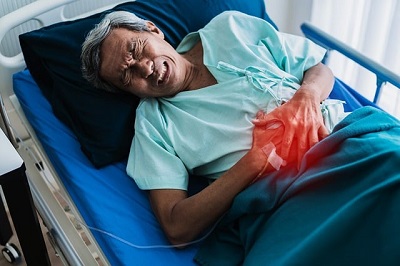What Causes Persistent Abdominal Discomfort in Prostatitis?
Prostatitis, a bothersome condition affecting many men, often brings a series of discomforting symptoms, among which constant abdominal discomfort is a common and frustrating manifestation.

The discomfort in the abdomen is often not sharp but dull and persistent and sometimes accompanied by a sense of heaviness. This discomfort seriously affects the patient's quality of life and makes them restless.
So, why does prostatitis cause abdominal discomfort?
This is mainly due to inflammation that stimulates the prostate and surrounding tissues and nerves. When the prostate is inflamed, pathological changes such as congestion and swelling occur, leading to an increase in prostate volume and thereby exerting pressure on surrounding tissues and nerves. In addition, inflammation releases inflammatory mediators such as prostaglandins, further exacerbating pain and discomfort.
Prostatic inflammation can also spread to surrounding tissues, such as the base of the bladder and the area around the rectum. These adjacent tissues also have rich nerve distributions, and once affected by inflammation, they can also cause abdominal discomfort.
Different types of prostatitis may vary in the severity and characteristics of abdominal discomfort:
Acute bacterial prostatitis usually has a sudden onset. Besides abdominal discomfort, patients may also experience high fever, chills, frequent urination, urgency, and dysuria. In such cases, abdominal pain is often severe, requiring timely anti-infective treatment.
Symptoms of chronic bacterial prostatitis are relatively mild, but abdominal discomfort may persist, varying in intensity, and may also be accompanied by urethral discharge, sexual dysfunction, and other issues.
Chronic prostatitis is the most common type, characterized by long-term and recurrent pelvic area pain or discomfort, including the abdomen, perineum, and testicles. The nature of the pain varies, including dull, throbbing, or stabbing pain. The etiology of this type of prostatitis is complex and may involve various factors such as infection, immunity, and neuroendocrine factors, among others.
In terms of treatment, different types of prostatitis require different approaches:
The primary treatment for acute bacterial prostatitis involves using sensitive antibiotics for anti-infective therapy, often requiring intravenous antibiotic administration to control inflammation quickly. At the same time, patients should rest, drink plenty of water, and avoid sexual activity.
Treatment for chronic bacterial prostatitis also involves antibiotics, but the treatment is more prolonged, generally lasting 4-6 weeks or even longer. In addition, medications to alleviate symptoms may be used, such as alpha-blockers, which relax the smooth muscles of the prostate and bladder neck, alleviating difficulty urinating and abdominal pain; nonsteroidal anti-inflammatory drugs can reduce inflammation and pain; herbal remedies can help improve prostate function.
Treatment for chronic prostatitis is more complex. In addition to the medications mentioned above, physical therapies such as prostate massage and heat therapy can promote blood circulation in the prostate, relieving inflammation and pain. Psychological treatment is also crucial because long-term pain and discomfort can lead to anxiety, depression, and other psychological issues that can affect treatment effectiveness.
Among various treatment methods, traditional Chinese medicine, such as Diuretic and Anti-inflammatory Pill, has attracted increasing attention from patients in recent years. The pill has multiple effects, such as clearing heat, detoxifying, promoting diuresis, and promoting blood circulation to remove blood stasis, effectively alleviating abdominal discomfort caused by prostatitis.
Furthermore, changing poor lifestyle habits is crucial for alleviating abdominal discomfort. Patients should avoid prolonged sitting, holding urine, and long cycling periods. They should keep warm, avoid getting cold, maintain a bland diet, avoid spicy and irritating foods, quit smoking and alcohol, and maintain regular sexual activity.
It is important to note that treating prostatitis often requires time, and patients need to be patient and confident. Sometimes, even with standardized treatment, symptoms of abdominal discomfort may not immediately disappear altogether, but with consistent treatment, symptoms usually gradually alleviate.
Recommend readings:



